Trump Xi: Property man meets career communist
- Published
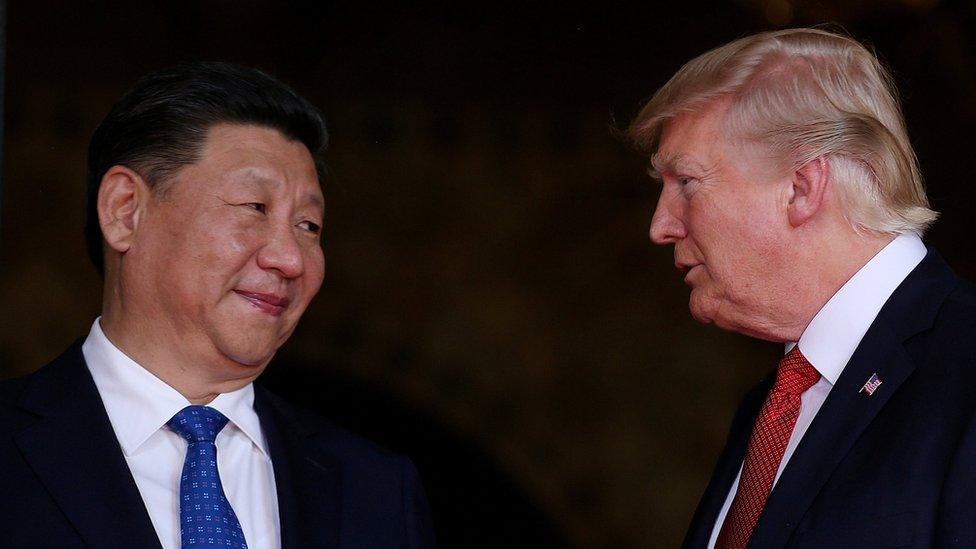
Mr Xi has a decidedly different personality to that of Mr Trump
Donald Trump is the kind of person who occasionally gets locked up in Xi Jinping's China. A boastful billionaire, someone who thinks he is bigger than the Party, bigger than the national project.
Such a colossus can disappear to no known location for a period of quiet reflection with the help of the Communist Party's discipline enforcers, later to reappear muttering grateful homilies on what the Party has done for his business.
As President Trump and President Xi prepare to meet in Beijing, the contrast between the leaders of the world's economic superpowers is stunning.
Where senior members of Mr Trump's own Republican Party have dismissed his White House as an "adult daycare centre" , Mr Xi's Party lieutenants describe the Chinese president as a great and wise leader, "the saviour of socialism".
Mr Trump cannot even depend on fellow US capitalists. The titans of the American tech world are not travelling to Asia with Team Trump. Instead Facebook's Mark Zuckerberg. Apple's Tim Cook and Microsoft's Satya Nadella stood shoulder to shoulder in Beijing with President Xi last week for a group photograph of the advisory board for a top Chinese university.
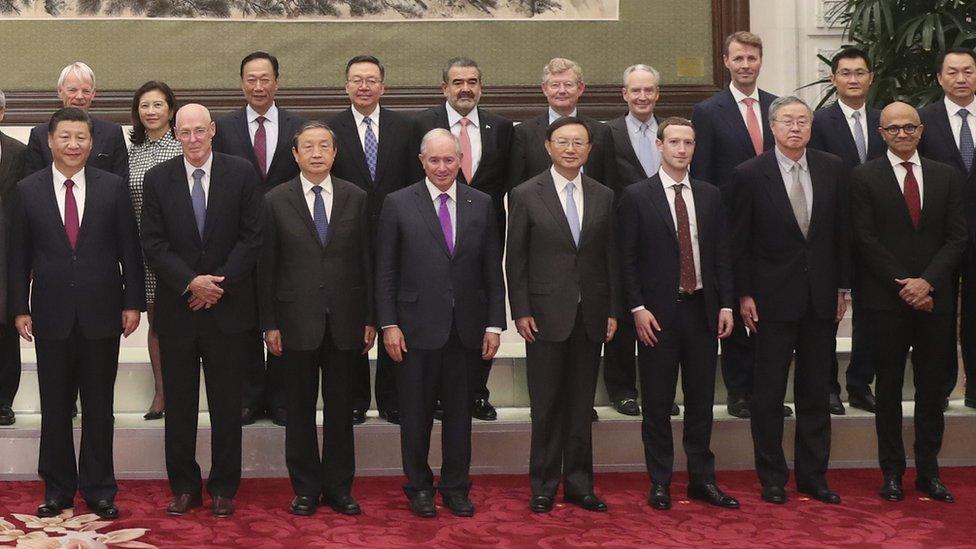
Mr Xi (far left) can be seen here in this photo with Mark Zuckerberg (third from right) and Satya Nadella (far right)
The asymmetry in public deference extends to the individuals themselves. Mr Trump has said repeatedly how much he respects Mr Xi and his "extraordinary elevation", describing him as a powerful man and a good friend. Former chief strategist Stephen Bannon has said "there is no leader Trump admires more". But in public, Mr Xi has never called Mr Trump a great anything, let alone a great friend.
Mr Xi claims to have read many American authors from Walt Whitman to Mark Twain and Ernest Hemingway but he has not listed Donald Trump among them. The real estate man's Art of the Deal may have been a business bestseller in America but a more reliable guide to Mr Xi's statecraft is Sun Zi's Art of War.
Mr Trump advises, "You can't be imaginative or entrepreneurial if you've got too much structure. I prefer to come to work each day and just see what develops."
But the ancient military text, required reading for all Chinese strategists, urges, "Know the enemy, know yourself and your victory will never be endangered. Know the ground, know the weather and your victory will then be total."
The contrast between Mr Xi and Mr Trump stretches back across a lifetime. After a cosseted early childhood as the "red princeling" son of a revered revolutionary, Mr Xi spent seven years as a farmer living in a cave before embarking on a four-decade climb through China's political hierarchy.
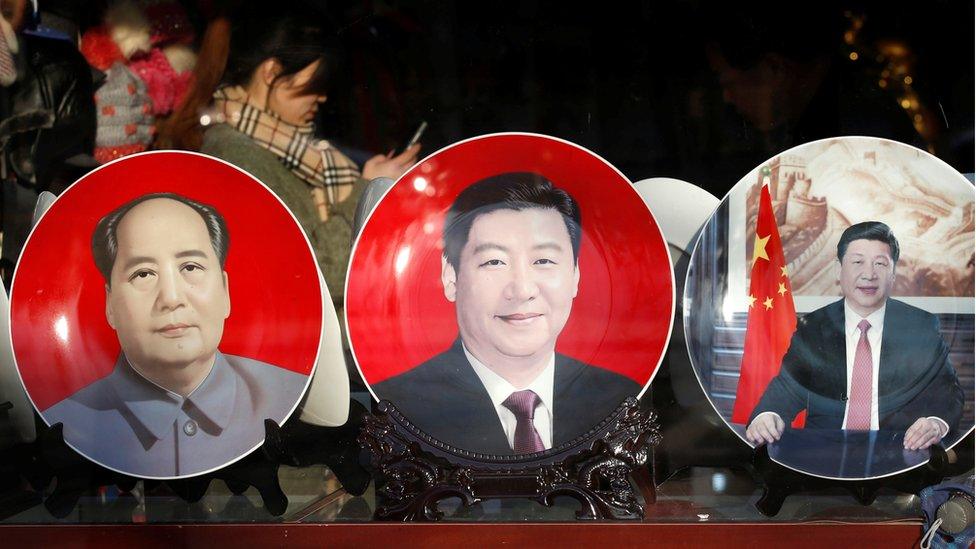
The recent Communist Party congress lifted Xi Jinping to a level similar to that of Mao Zedong
To reach the pinnacle of the 89-million strong Chinese Communist Party is a feat which requires iron discipline and strategic patience. Neither quality is often mentioned in character sketches of Donald Trump.
Unsurprisingly there are style differences too. Mr Xi rarely starts a sentence with the word "I", wrapping his leadership instead in the dignity of the national flag. He aims to embody something sacred, the dream of "the great rejuvenation of the Chinese nation". For this he must appear at all times sober, steady, invincible.
To the extent that he has a personality cult, it is exacted from others. Schools, universities, company board rooms and government offices across China are now embarking on the study of "Xi Jinping Thought".
By contrast, Mr Trump's personality cult starts with Mr Trump and the first person pronoun "I" is rarely off his lips. As he tours Asia, he leaves behind an America mired in what Chinese state media gloatingly describe as "crisis and chaos".
An odd couple
But for all the contrasts, the career communist and the property magnate do have two things in common. They both exercise enormous power and they both have great self-belief. Mr Xi and Mr Trump view themselves as the saviours of their countries and each views his country as exceptional in the world. Xi Jinping's "great rejuvenation of the Chinese nation" came before Donald Trump's "make America great again".
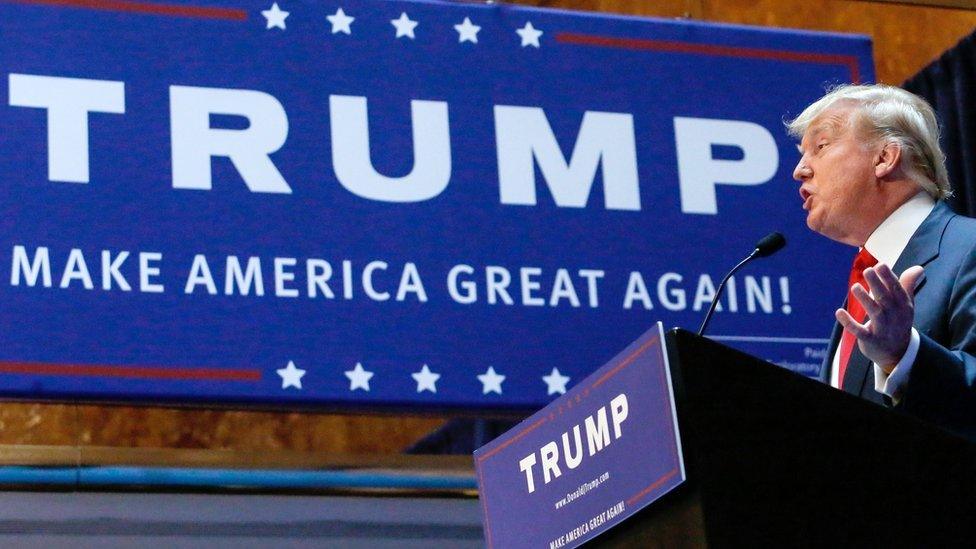
Both Trump and Xi promise a return to past glory
But the promise is the same: to rediscover a golden age of great power supremacy and allow no outside interest to stand in its way.
As Mr Xi and Mr Trump share the world stage this week in the pageantry of what China describes as a "state visit plus", the big question will be whether they can find a way for their countries to be great together or whether this has to be a zero sum game where the greatness of one demands the diminution of the other.
Of course this is not just a question for this week's odd couple but a question for our lifetimes. With the benefit of hindsight we may look back on Mr Trump's Asia tour and see it as the recalibration of deep and staying American power or as a milestone towards US displacement by China.
Perhaps history will place the visit in neither of these momentous narratives but instead frame the week as the last quaint ritual of a vanished world, the arranging of deck chairs on the Titanic, the calm before a storm.
Reined in
Let's take these scenarios in turn. On the eve of Mr Trump's tour, his administration suddenly started using a new strategic slogan, talking of "a free and open Indo-Pacific". Until this rabbit from a hat is sketched out more fully, it is hard to know exactly how it differs from the vision of previous US administrations.
But the purpose must be to reassure allies and friends and shore up American credibility after Mr Trump's criticisms over trade deficits and defence spending, and his abandonment of the Obama administration's TPP trade deal for the region.
The message is that Mr Trump's senior staff, the so-called adults in the room, have reined in the president's disruptive instincts and restored US policy in Asia to its former compass setting. If a "free and open Indo-Pacific" turns into more than a slogan, history may describe this tour as the moment when a still vigorous US superpower reinforced the economic and security ties that bind it to Asia, with allies and friends gratefully uniting behind it for protection against a prickly and assertive China.
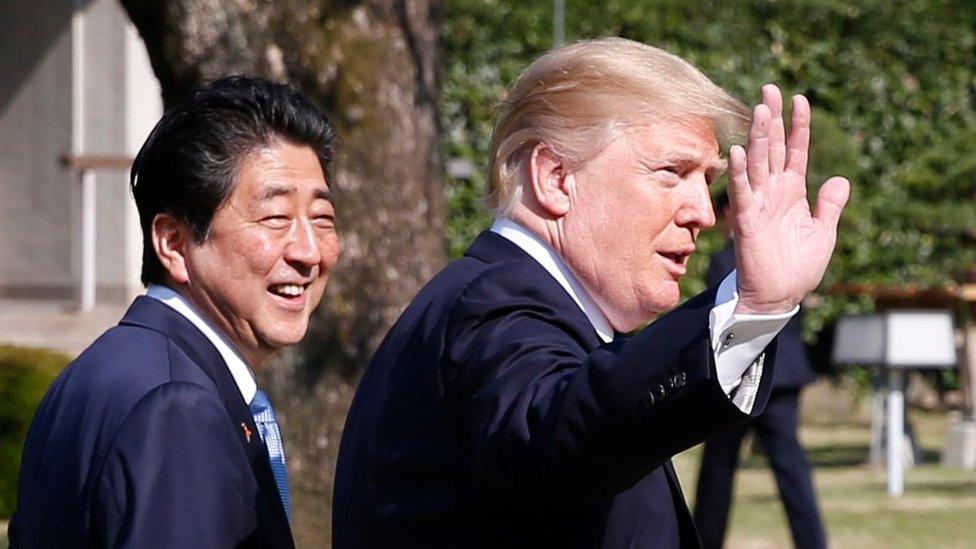
Mr Trump counts Japan's PM Shinzo Abe as one of his close allies
In the second version of history, Mr Trump's Asia tour is a point of intersection in the arc of China's rise and the arc of America's decline. For all his unfailing politeness to his guest, this is the version of history which Xi Jinping is attempting to write. He intends a coherent strategic push between now and mid-century building on growing hard and soft power.
Mr Trump may be focused on Asia this week, but every other week he is consumed by problems at home, while China shows up in the region daily. With immense energy and purpose, it pours money into regional development, diplomacy, military ties and media, mounting a calculated charm offensive even in countries which have been American allies for seven decades.
All of Asia can see that Mr Xi has just emerged from a Communist Party Congress with his power dramatically enhanced, and on the surface at least, China shows none of the division and incoherence of the US.
Winning weapons
But no American president could willingly play the part allotted him in this narrative. Which is where the third scenario of the vanishing world comes in. On the campaign trail last year Mr Trump raged about China's "rape" of the American economy and "theft of American jobs". He promised that if elected, he would succeed where predecessors failed… "cunning" Chinese leaders would no longer "out-smart, out-manoeuvre and out-negotiate" American ones.
The frustration was echoed across American political and business elites where many felt China was winning the superpower race on a rigged running track.
But every new US president of the 21st Century has said he intends to rise to the strategic challenge of China only to be knocked off course by events. For George W Bush it was 9/11 and the wars in Afghanistan and Iraq. For Barack Obama, the pivot to Asia took second place to financial crisis at home and Middle East crisis abroad.
The China of 2017 is much stronger and more confident than that of 2001 or 2009. And under Mr Xi it is committed to a war of values against American ideals of freedom and democracy.
Last week, Mr Xi led his top team, fists clenched, in a ritualised oath of allegiance to the Communist Party flag. While for all Donald Trump's symbolism of a long Asian tour and fine words about a "free and open Indo-Pacific", this US president has only just put in place a China team much less a strategy.
In fact since taking office, Chinese leaders have been relieved to see Trump's China trolling stay on Twitter. He has issued warnings over Beijing's trade with North Korea and launched an investigation of Chinese trade practices with the US, but he has imposed no sanctions against the massive asymmetries that defeat US aspirations in China.
This may change in the months ahead. If the US were to move from grumbling co-operation with China to more robust competition, the consequences for Asia and for the world would be as unpredictable as they would be momentous.
Mr Xi is determined to avoid that. He needs a stable world and stable American export market to complete his rejuvenation of China. In Beijing this week, he will try to disarm Mr Trump.
Flattering photo opportunities are what China does best and they are a great deal cheaper than opening key markets or throttling the North Korean economy. So the host will play to his guest's love of pomp by putting on a lavish spectacle.
He will encourage Mr Trump to imagine that this is a chapter in the Art of the Deal rather than the Art of War.
After all, as Sun Zi pointed out in his ancient book of warcraft, deception, diplomacy and divide-and-rule are all winning weapons for a great commander.
"The supreme excellence is to subdue the armies of your enemies without having to fight them."
- Published4 November 2017
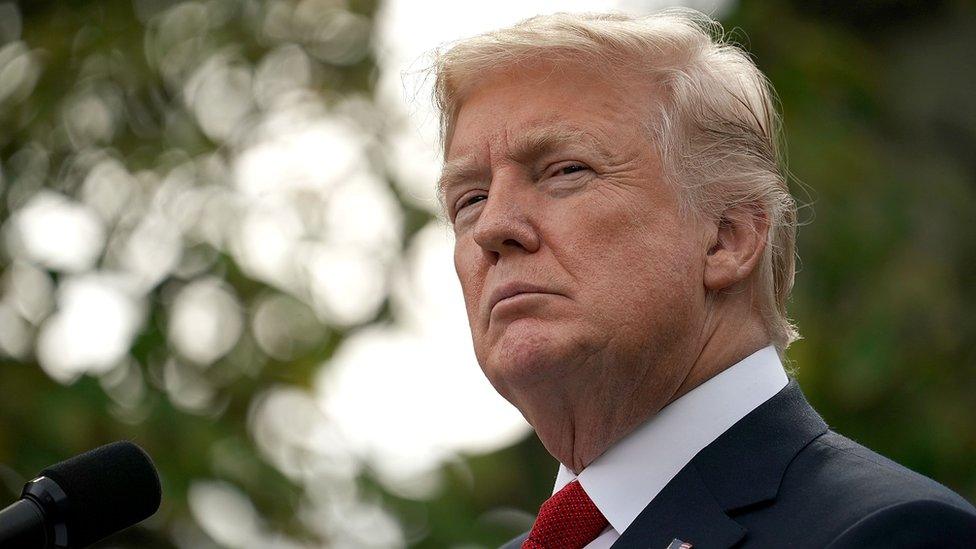
- Published25 October 2017